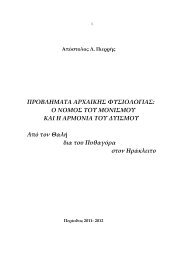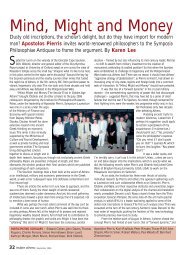APPENDIX C΄ ON DEPILATION: BODY COSMETICS IN CLASSICAL ...
APPENDIX C΄ ON DEPILATION: BODY COSMETICS IN CLASSICAL ...
APPENDIX C΄ ON DEPILATION: BODY COSMETICS IN CLASSICAL ...
Create successful ePaper yourself
Turn your PDF publications into a flip-book with our unique Google optimized e-Paper software.
582 <strong>APPENDIX</strong> <strong>C΄</strong><br />
built, large, smooth, shining body of a well-developed and welltrained<br />
youth. It was the ridiculous affectation of what one does not<br />
really possess, at which the Greeks were liable to, and did indeed, take<br />
offence the more intensely, the more they cherished and loved the<br />
natural manifestation of that ideal. The contrariety to nature of the<br />
enterprise, and its corresponding futility, are well brought out by<br />
Persius in his famous passage, Satyra IV, 33-41:<br />
at sic unctus cesses et figas in cute solem,<br />
est prope te ignotus cubito qui tangat et acre<br />
despuat: hi mores! penemque arcanaque lumbi<br />
runcantem populo marcentis pandere vulvas!<br />
tunc cum maxillis balanatum gausape pectas,<br />
inguinibus quare detonsus gurgulio extat?<br />
Quinque palaestritae licet haec plantaria vellant<br />
elixasque nates labefactent forcipe adunca,<br />
non tamen ista felix ullo mansuescit aratro.<br />
Before proceeding further, I shall adduce two more examples for<br />
the qualifications required to be made in the more well-known<br />
negative attitude. I shall mention them especially as they exhibit the<br />
woman’s point of view, and are not located within the standard and<br />
normal context of the love of the man for the young man (as e.g. in<br />
Theocritus, E, 90; and in passage after passage of the XIIth book of<br />
the Anthologia Graeca; v. e.g. 13; 191; 195). In Lucian, Dialogi<br />
Marini, I, 1, two Nereides converse with each other, Doris making fun<br />
of Galateia on account of the latter’s lover: whom she calls ironically<br />
ηÏeÓ âÚ·ÛÙ‹Ó; she really disapproves of him because he is ôÁÚÈÔ˜<br />
(the uncouth, rustic robustness we were talking about above - he is a<br />
appleÔÈÌ‹Ó), Ï¿ÛÈÔ˜ (pilosus) and ÌÔÓfiÊı·ÏÌÔ˜. Galateia, it is true,<br />
rejoins that his Ï¿ÛÈÔÓ and ôÁÚÈÔÓ is àÓ‰Úá‰Â˜, but the point is being<br />
made that being (at least markedly) hairy can be considered to detract<br />
from beauty even in a man past his youth. In Lysistrata, 800-804, we<br />
see that an old woman scoffs at an old man on account of his dense<br />
hair in the membrum’s area; the Ïfi¯ÌË (thicket) is there to be seen, as<br />
is clear firstly from the immediately preceding verse (799: ÎàÓ·Ù›ӷ˜<br />
Ï·ÎÙ›Û·È), which as the scholiast remarks (Ùe ÛΤÏÔ˜ j Ùe ·å‰ÔÖÔÓ) is<br />
a play of double entendre: raising the foot or the membrum to kick










